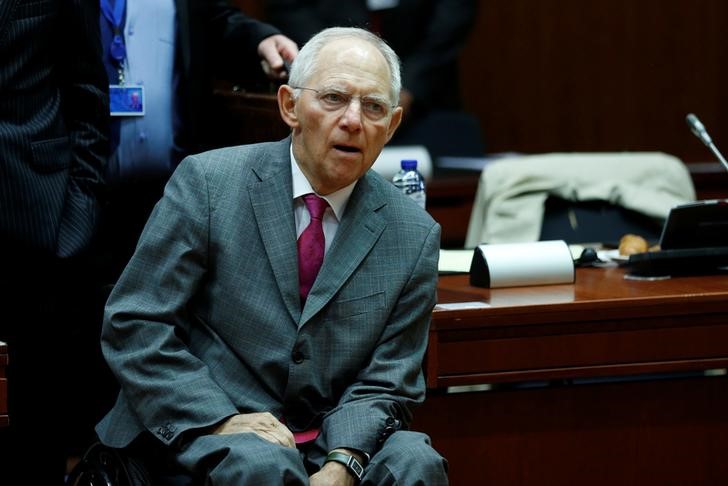By Tom Körkemeier and Joseph Nasr
BERLIN (Reuters) - German Finance Minister Wolfgang Schaeuble wants to reform the euro zone's bailout fund so that it can play a stronger role in preventing crises in the single currency bloc, a spokeswoman said on Wednesday.
Mass-selling daily Bild earlier reported Schaeuble would unveil details to reform the European Stability Mechanism (ESM) after German parliamentary elections next month, and that governments would be allowed to use the fund to boost investments during recessions.
"The position of the German finance ministry has not changed. We are not working on a new fund of billions," the spokeswoman said when asked about Bild's report.
"We want a deepening of the euro zone," the spokeswoman said, adding that Schaeuble had repeatedly called for the ESM to be transformed into a European version of the International Monetary Fund (IMF).
"This fund can then play a stronger role in preventing crises in the euro zone."
That would not exempt states from the obligation to carry out reforms and it was important that risks and liabilities arising from political decisions remained linked, she said.
Bild said Schaeuble's proposal was a goodwill gesture towards French President Emmanuel Macron who has promised to work with Germany on a roadmap for closer euro zone integration.
The newspaper said Schaeuble would unveil it after the Sept. 24 election that his conservatives headed by Chancellor Angela Merkel are heavily tipped to win.
The plan is to give countries more flexible access to the ESM in exchange for the bailout fund having more say over national debt and budgets, Bild said.
Currently, countries only have access to the fund when in dire financial need. Under such a reform, the ESM would serve as a kind of euro zone budget, available for counter-cyclical investment spending.
Germany is the biggest contributor to the fund.
Schaeuble said earlier this year that he shared Macron's view that financial transfers from richer to poorer states were necessary within the euro zone.
The finance ministry spokeswoman denied Bild's assumption that Schaeuble was also considering common debt for the single currency bloc under a eurobonds system.
Merkel's conservatives are opposed the idea of joint borrowing by euro zone states. But Martin Schulz, the head of their Social Democrat rivals, has said such bonds were needed to relieve the bloc's debt crisis.
A joint euro zone budget and a common finance minister are among ideas circulating over the issue of deeper European Union integration after Britain leaves the EU in 2019. Completing a banking union is also part of the debate.

Schaeuble is unpopular in many southern euro zone countries, and especially in Greece, for insisting on tough austerity measures in exchange for bailout funds during the bloc's debt crisis.